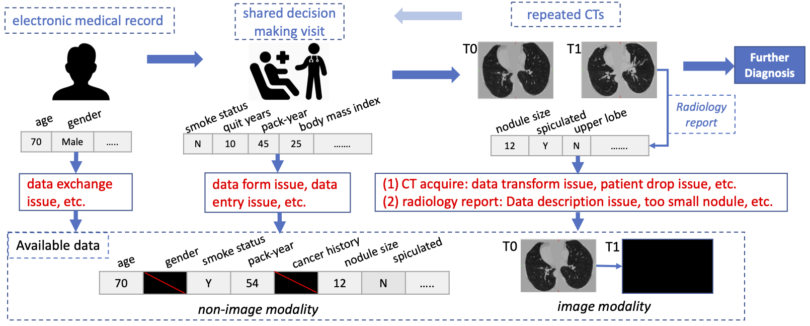Lung Cancer Risk Estimation with Incomplete Data: A Joint Missing Imputation Perspective
Riqiang Gao, Yucheng Tang, Kaiwen Xu, Ho Hin Lee, Steve Deppen, Kim Sandler, Pierre Massion, Thomas A. Lasko, Yuankai Huo, Bennett A. Landman, Lung Cancer Risk Estimation with Incomplete Data: A Joint Missing Imputation Perspective, MICCAI, 2021.
Full text: https://arxiv.org/abs/2107.11882
Abstract
Data from multi-modality provide complementary information in clinical prediction, but missing data in clinical cohorts limits the number of subjects in multi-modal learning context. Multi-modal missing imputation is challenging with existing methods when 1) the missing data span across heterogeneous modalities (e.g., image vs. non-image); or 2) one modality is largely missing. In this paper, we address the imputation of missing data by modeling the joint distribution of multi-modal data. Motivated by partial bidirectional generative adversarial net (PBiGAN), we propose a new Conditional PBiGAN (C-PBiGAN) method that imputes one modality combining the conditional knowledge from another modality. Specifically, C-PBiGAN introduces a conditional latent space in a missing imputation framework that jointly encodes the available multi-modal data, along with a class regularization loss on imputed data to recover discriminative information. To our knowledge, it is the first generative adversarial model that addresses multi-modal missing imputation by modeling the joint distribution of image and non-image data. We validate our model with both the national lung screening trial (NLST) dataset and an external clinical validation cohort. The proposed C-PBiGAN achieves significant improvements in lung cancer risk estimation compared with representative imputation methods (e.g., AUC values increase in both NLST (+2.9%) and in-house dataset (+4.3%) compared with PBiGAN, p<0.05).
